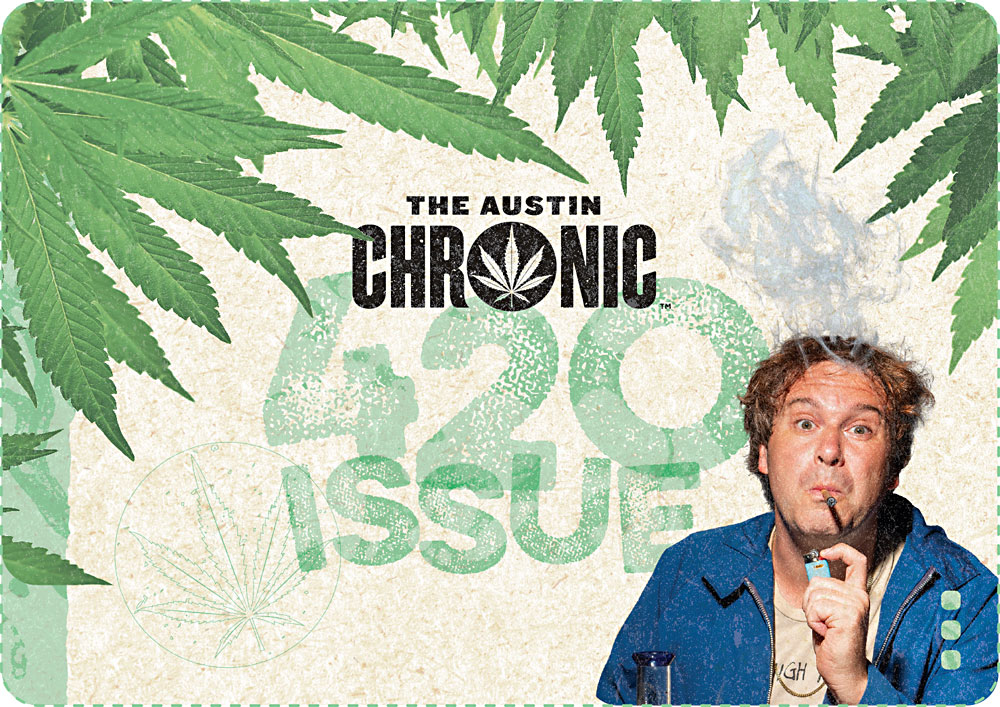Does Dan Patrick Even Understand the Cannabis Industry He’s Trying to Kill?
Texas Lege’s draconian bills are making even the stoners frustrated
By Kevin Curtin, Fri., April 18, 2025
One therapeutic aspect of marijuana that I value is that it cures frustration. For me, a single hit of weed can shut off acute frustration like a light switch, which helps me be a better parent, friend, partner, and neighbor. Generalized frustration too – when I sit down to alter my consciousness, I’m able to look back on my day differently, letting go of the bullshit and processing negative interactions in a way where I can laugh about it... and, often, laugh at myself. That’s therapy.
I think a common root of frustration is dealing with people who are operating with no clear logic, like Texas’ lawmakers.
Texas’ 89th legislative session had been hotly anticipated by cannabis industry constituents. Since the last meeting of the Lone Star Lege, the consumable hemp market went mainstream and its operators were calling for a higher standard of regulation: limiting products to age 21 and up, requiring child-resistant packaging, establishing better lab testing standards, and banning synthetic cannabinoids.
Asking for changes that would increase the legitimacy of their industry, that business community received, instead, a plan for their extinction. A priority Senate bill, SB 3, promoted a total ban on THC, except for within the medical system. Its author, Sen. Charles Perry, who sponsored the 2019 farm bill that accidentally legalized consumable hemp, says hemp sellers “got cute” with a law that was intended to stimulate industrial hemp agriculture.
SB 3 has a high-profile cheerleader in Lt. Gov. Dan Patrick, who preempted the bill’s filing with a December press release that claimed consumable hemp retailers “target your children” and that the products were “life-threatening.”
The finest piece of comedy in Patrick’s continued promotion of the controversial bill came in March when the 75-year-old former sports radio personality entered a hemp store in Austin and seemed genuinely shocked to be asked to show his ID.
“Our employee had carded him in our shop and that was definitely one of the things he was trying to catch people on,” says Todd Harris, co-owner of the Happy Cactus. While there, Patrick asked to speak with the owner on the phone.
“He wanted to ask about our shop: what products we sell. So I told him that we sell 2018 farm bill-compliant hemp products,” Harris says of the 10-minute phone call. “He was asking about our dosage and we went over that with him. Because he was talking about some shops having very high doses, we explained to him that us and most people in the industry do keep it down to 10 or 20 milligrams per dose. The highest dose we have in our shop is 20 milligrams. He asked how many children come into our shop and we informed him that we don’t have anyone under 21 come into the shop and that we card everyone – even the lieutenant governor.”
Harris says he’s actually glad that Patrick chose the Happy Cactus because he wants lawmakers to see how diligent they have been at regulating themselves and how well the staff is trained.
Mickey Harris, who co-owns the Happy Cactus with his brother, says they choose their products carefully to help customers who have issues with sleep and PTSD. He believes most consumable hemp businesses already self-regulate in terms of age restrictions, dosage, and packaging, but welcomes additional regulations to help “the industry move forward in the safest way.”
“If SB 3 did pass, we wouldn’t be able to sell 80 to 90 percent of our products – possibly more. The only thing that would be legal is broad-spectrum CBD,” Mickey Harris says. “Farmers that grow hemp and sell to manufacturers for clothing or building materials would be shut down because it’s impossible to grow hemp plants without some THC. So it wouldn’t just shut down our business – employees would be losing their jobs and it would impact farmers.”
On March 19, the Senate passed SB 3 at a vote of 26-5. That was expected, given the lieutenant governor’s influence over the chamber, but it’d likely face a harder road in the House.
Not Laying Down to Die
The threat of SB 3 has grown cannabis advocacy and crystallized a community of people standing up for their businesses. On April 7, consumable hemp advocates showed up en masse for an early morning House State Affairs Committee hearing. Hundreds of Texans filled the lobby and an overflow room, waiting upward of 11 hours to give testimony on SB 3 and HB 28.
Mitch Fuller, legislative chairman for the Texas VFW, spoke in opposition to SB 3, arguing that it would eliminate a therapeutic option that many veterans rely on to manage service-related conditions, like PTSD.
“The Texas VFW strongly opposes SB 3, which will ban an effective, affordable, and accessible alternative to the harmful pharmaceutical cocktail of opioids and antidepressants utilized by thousands of veterans,” Fuller told the committee. “Now we’re fighting to preserve our freedom to make responsible health care choices, including access to legal hemp-derived products that have transformed our lives.”
Others focused their testimony on HB 28, a House effort to ban smokable hemp flower and THC gummies, while only permitting THC beverages. Many see it as a bold play by the liquor lobby to take over an industry that others built because it proposes giving regulatory control to TABC and mandates that liquor distributors act as a required middleman between manufacturer and retailers.
At the hearing, João Mitchell, the general manager of sustainability-conscious hemp retailer ATX Organics, raised concerns about how TABC’s three-tiered system would impact hemp.
“I don’t appreciate that HB 28 prioritizes the concerns of the alcohol industry over those in the hemp industry,” he testified. “Preventing the vertical integration of the companies in our industry through the enforcement of a three-tiered system will increase costs for us as well as our customers. TABC is an agency with a noted history of corruption and bad actors. [The Department of Health and Human Services] is much better equipped to regulate the hemp industry and has experience in doing so.”
Mitchell also addressed one of the hearing’s recurring discussions: that THCA vape pens could contain residual chemicals or synthetic substances.
“I’ve heard and understood concerns today about vape pens and I have the solution right here,” he said, pulling a vape from the inside pocket of his suitcoat. “This is a live rosin vape. It is fully plant based, full spectrum, solventless, and free of synthetics.”
Great public speaking move: Always bring a prop.
Cowboys and Christians
On an overcast Saturday in April, I’m at the public unveiling of a sustainably built, energy-efficient residential structure in South Austin. There’s a spread with good cheese and it’s a cute house ... and it’s made out of hemp.
The property belongs to Susan Hays, an attorney, lobbyist, and marijuana advocate who ran for agriculture commissioner in the last election. Hays is tough, insightful, and distinctly Texan, so I figured she’d be a good person to ask a question about identity.
Historically, we’ve been sold a spirit of Texas that’s steeped in personal liberty with limited government and pro-business philosophies. And yet, all of that feels somehow incongruent with regressive cannabis laws that limit Texans’ rights and kill industries and put farmers at a disadvantage.
“This tension has always been in the American West,” she replies. “Texas has a clash between the freedom-loving cowboy and religious extremism – people who want to impose their religion politically.
“I grew up in the Eighties in small-town Texas. The culture was you didn’t talk about it outside of church much – it was considered untoward. My grandmother very much taught me never to do business with anyone who carries a Bible out of church. That religious extremism – and by extremism, I mean, 'You have to live by my rules’ – has taken over the dominant political culture, and that’s why we’re having this clash.”














